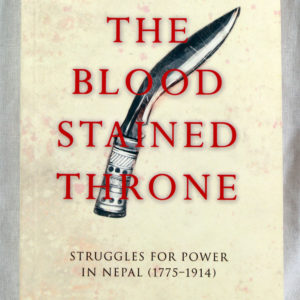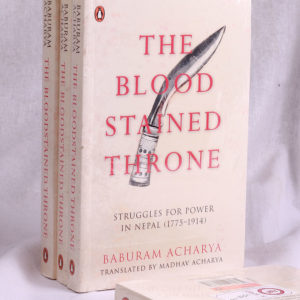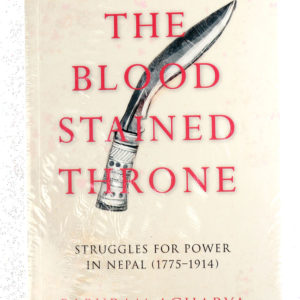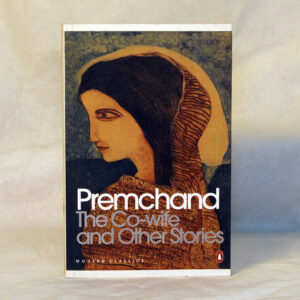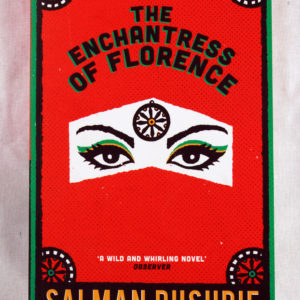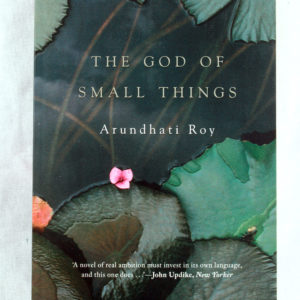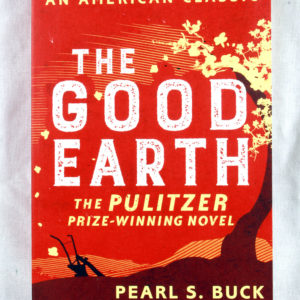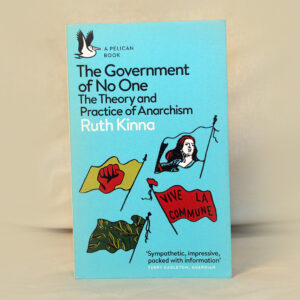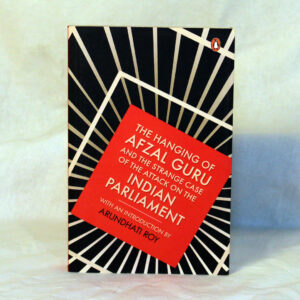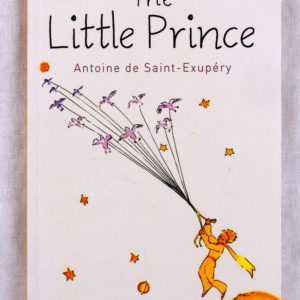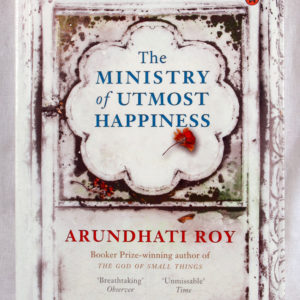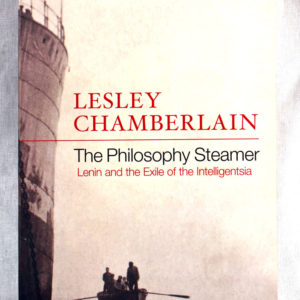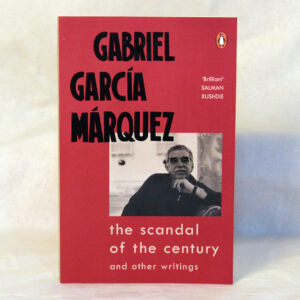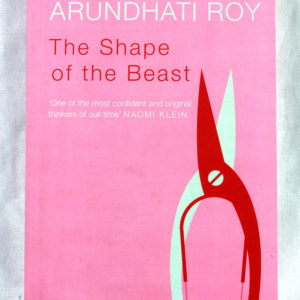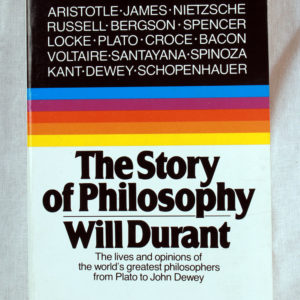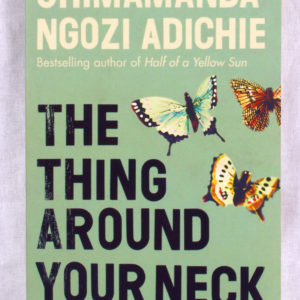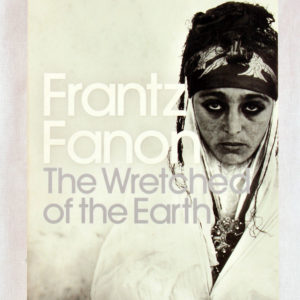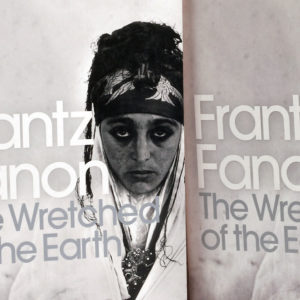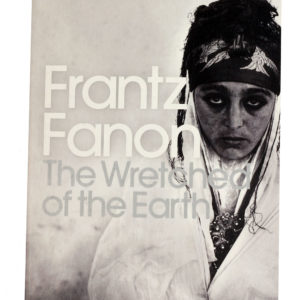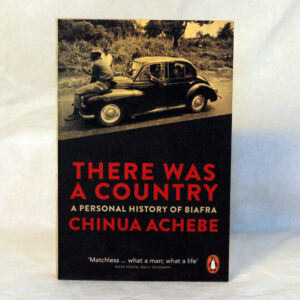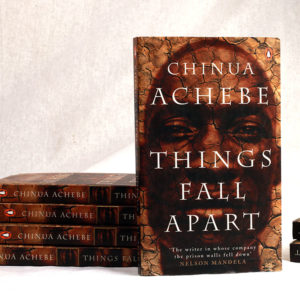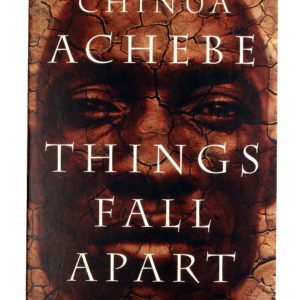SHOP
Fluent’s shop can be set to full-width, boxed.
It may have a left or right sidebar. You can set the number of columns the orientation of rows and…
Filter
Nepal, land of Buddhism and misty mountains, is not a nation whose history one would expect to be filled with blood. And yet, the struggle to gain and keep control of the mountain kingdom is one marked by a long history of violence and murder. The Bloodstained Throne is a translation of Aba Yasto Kahilyai Nahos, a compilation of historic essays that recount some of the bloody battles for power in a tumultuous period a phase that spanned more than one hundred years.
Published posthumously in Nepali, this tale of the machinations, massacre and bloodletting that rocked Nepal s power centre the royal palace will give you a rare and fascinating glimpse into one of the least-known and most violent power struggles that South Asia has ever seen.
This tale of the machinations, massacre and bloodletting that rocked Nepal’s power centre—the royal palace—will give you a rare and fascinating glimpse into one of the least-known and most violent power struggles that South Asia has ever seen.
The Enchantress of Florence is the ninth novel by Salman Rushdie, published in 2008. According to Rushdie this is his “most researched book” which required “years and years of reading”.
The novel was published on 11 April 2008 by Jonathan Cape London, and in the United States by Random House.
‘Editors K. Satyanarayana and Susie Tharu have drawn from their previous experience editing anthologies of Dalit writing from south India to collate poetry, essays, memoir and fiction into an immersive experience of Dalit literature as both aesthetic and socio-political identity.’— LiveMint
Read an excerpt published in the Hindustan Times.
The God of Small Things is the debut novel of Indian writer Arundhati Roy. It is a story about the childhood experiences of fraternal twins whose lives are destroyed by the “Love Laws” that lay down “who should be loved, and how. And how much.” The book explores how the small things affect people’s behavior and their lives. It won the Booker Prize in 1997.
The God of Small Things was Roy’s first book and only novel until the 2017 publication of The Ministry of Utmost Happiness twenty years later. She began writing the manuscript for The God of Small Things in 1992 and finished four years later, in 1996. It was published the following year. The potential of the story was first recognized by Pankaj Mishra, an editor with HarperCollins, who sent it to three British publishers. Roy received £500,000 in advance and rights to the book were sold in 21 countries.
The Good Earth is a novel by Pearl S. Buck published in 1931 that dramatizes family life in a Chinese village in the early 20th century. It is the first book in a trilogy that includes Sons (1932) and A House Divided (1935). It was the best-selling novel in the United States in both 1931 and 1932, won the Pulitzer Prize for Fiction in 1932, and was influential in Buck’s winning the Nobel Prize for Literature in 1938. Buck, who grew up in China as the daughter of missionaries, wrote the book while living in China and drew on her first-hand observation of Chinese village life. The realistic and sympathetic depiction of the farmer Wang Lung and his wife O-lan helped prepare Americans of the 1930s to consider Chinese as allies in the coming war with Japan.
The novel was included in Life Magazine’s list of the 100 outstanding books of 1924–1944. In 2004, the book returned to the bestseller list when chosen by the television host Oprah Winfrey for Oprah’s Book Club.
The Little Prince, French Le Petit Prince, fable and modern classic by French aviator and writer Antoine de Saint-Exupéry that was published with his own illustrations in French as Le Petit Prince in 1943. The simple tale tells the story of a child, the little prince, who travels the universe gaining wisdom. The novella has been translated into hundreds of languages and has sold some 200 million copies worldwide, making it one of the best-selling books in publishing history.
The Ministry of Utmost Happiness takes us on an intimate journey across the Indian subcontinent—from the cramped neighborhoods of Old Delhi and the roads of the new city to the mountains and valleys of Kashmir and beyond, where war is peace and peace is war. Braiding together the lives of a diverse cast of characters who have been broken by the world they live in and then rescued, patched together by acts of love—and by hope, here Arundhati Roy reinvents what a novel can do and can be.
The Motorcycle Diaries is a story which revolves around 2 men who embark on a road journey on a 1939 Norton 500cc cylinder motorcycle from Buenos Aires. They are out to discover and explore South America. This book had been written 8 years prior to the Cuban Revolution. The person who wrote the memoirs of this journey was one of those 2 bikers, Ernesto Guevara. He focused on the injustices that were prevalent at that time in South America.
Trotsky’s theory of the permanent revolution is one of the most important additions to the arsenal of marxism. It was first developed by Trotsky in 1904, on the eve of the first Russian Revolution. At that time, all the tendencies of the Russian Social Democracy had the perspective of a bourgeois democratic revolution. Trotsky alone in 1905 put forward the idea that the Russian working class could come to power before the workers of Western Europe. The correctness of Trotsky’s theory was brilliantly demonstrated in 1917, when the Bolshevik Party under Lenin and Trotsky led the Russian proletariat to power in the first workers state in the world.
However, after the death of Lenin in 1924, the theory of the permanent revolution was subject to a vitriolic onslaught by the stalinist bureaucracy, which had in effect renounced world revolution in favour of “socialism in one country”. The attack on the theory came to epitomise the struggle against “Trotskyism”. Today, however, with the collapse of Stalinism (and with it “socialism in one country”), Trotsky’s theory of the permanent revolution has become more relevant than ever.
Publisher : Aakar Publications
‘Compelling, laudably unsentimental and deeply significant.’ — Frances Stonar Saunders, GuardianIn 1922, Lenin personally drew up a list of some 220 ‘undesirable’ intellectuals to be deported in preparation for the creation of the Soviet Union in December of that year. Two ships sailed from Petrograd that autumn, taking around 70 of these eminent men and their families away to what became permanent exile in Berlin, Prague and Paris. Using diaries, letters and memoirs, The Philosophy Steamer tells the story of the philosophers, writers, journalists and scholars thrown out of their homeland and forced to join migr communities. It also explores the fate of ideas: not just those of Lenin, but also of the men who, though forced to leave their homeland, made unique contributions to the cultural and intellectual life of the twentieth century.’Chamberlain movingly describes the experience of exile in ways that echo that great exile novelist Nabokov himself… a richly humane and complex book of enormous spiritual depth by a remarkably talented author.’ — Michael Burleigh, Sunday Telegraph
The shape of the beast is our world laid bare, with great courage, passion and eloquence, by a mind that has engaged unhesitatingly with its changing realities, often anticipating the way things have moved in the last decade in the fourteen interviews collected here, conducted between january 2001 and september 2008, arundhati roy examines the nature of state and corporate power as it has emerged during this period, and the shape that resistance movements are taking as she speaks, among other things, about people displaced by dams and industry, the genocide in gujarat, maoist rebels, the war in kashmir and the global war on terror, she raises fundamental questions about democracy, justice and non-violent protest unabashedly political, this is also a deeply personal collection through the conversations, arundhati talks about the necessity of taking a stand, as also the dilemma of guarding the private space necessary for writing in a world that demands urgent, unequivocal intervention and in the final interview, she discusses with uncommon candour her ambiguous feelings about success and both the pressures and the freedom that come with it
Stretcher-Bearer of Empire
In the pantheon of global liberation heroes, Mohandas Karamchand Gandhi has pride of place. Leaders like Mandela have lauded him as being part of the epic battle to defeat the white regime and prepare the way for a non-racial country. A popular sentiment in South Africa goes: ‘India gave us Mohandas, and we returned him to you as Mahatma’.
Against this background, The South African Gandhi: Stretcher-Bearer of Empire unravels the complex story of a man who, throughout his stay on African soil (1893–1914), remained true to Empire while expressing disdain for Africans. For Gandhi, whites and Indians were bound by an Aryan bloodline that had no place for the African. His racism was matched by his class (and caste) prejudice towards the Indian indentured. He persistently claimed that they were ignorant and needed his leadership, and wrote their struggles out of history—struggles this book documents.
The authors show that Gandhi never missed an opportunity to demonstrate his loyalty to Empire, with a particular penchant for war. He served as stretcher-bearer in the war between Brit and Boer, demanded that Indians be allowed to carry fire-arms, and recruited volunteers for the imperial army in both England and India during the First World War.
Ashwin Desai is Professor of Sociology at the University of Johannesburg. His previous books include South Africa: Still Revolting, ‘We are the Poors’: Community Struggles in Post-Apartheid South Africa and Reading Revolution: Shakespeare on Robben Island among others.
Goolam Vahed is Associate Professor of History at the University of KwaZulu Natal. He writes on histories of migration, ethnicity, religion, and identity formation among Indian South Africans.
A brilliant and concise account of the lives and ideas of the great philosophers—Plato, Aristotle, Bacon, Spinoza, Voltaire, Kant, Schopenhauer, Spencer, Nietzsche, Bergson, Croce, Russell, Santayana, James, and Dewey—The Story of Philosophy is one of the great books of our time. Few write for the non-specialist as well as Will Durant, and this book is a splendid example of his eminently readable scholarship. Durant’s insight and wit never cease to dazzle; The Story of Philosophy is a key book for any reader who wishes to survey the history and development of philosophical ideas in the Western world.
A dazzling story collection from the best-selling author of Americanah and We Should All Be Feminists, “one of the world’s great contemporary writers” (Barack Obama).
In these twelve riveting stories, the award-winning Chimamanda Ngozi Adichie explores the ties that bind men and women, parents and children, Africa and the United States. Searing and profound, suffused with beauty, sorrow, and longing, these stories map, with Adichie’s signature emotional wisdom, the collision of two cultures and the deeply human struggle to reconcile them.
The Wretched of the Earth (French: Les Damnés de la Terre) is a 1961 book by Frantz Fanon, in which the author provides a psychiatric and psychologic analysis of the dehumanizing effects of colonization upon the individual and the nation, and discusses the broader social, cultural, and political implications inherent to establishing a social movement for the decolonization of a person and of a people. The French-language title derives from the opening lyrics of “The Internationale”.
The Wretched of the Earth (French: Les Damnés de la Terre) is a 1961 book by Frantz Fanon, in which the author provides a psychiatric and psychologic analysis of the dehumanizing effects of colonization upon the individual and the nation, and discusses the broader social, cultural, and political implications inherent to establishing a social movement for the decolonization of a person and of a people. The French-language title derives from the opening lyrics of “The Internationale”.
More than two million copies of Things Fall Apart have been sold in the United States since it was first published here in 1959. Worldwide, there are eight million copies in print in fifty different languages. This is Chinua Achebe’s masterpiece and it is often compared to the great Greek tragedies, and currently sells more than one hundred thousand copies a year in the United States.
A simple story of a “strong man” whose life is dominated by fear and anger, Things Fall Apart is written with remarkable economy and subtle irony. Uniquely and richly African, at the same time it reveals Achebe’s keen awareness of the human qualities common to men of all times and places.

